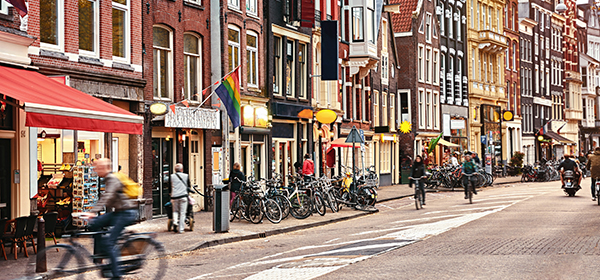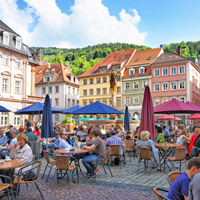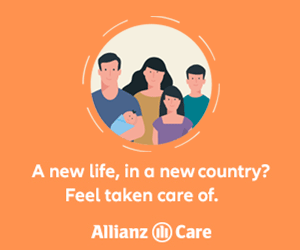10 Tips for Living in the Netherlands
Summary: Expats from all over the Netherlands share their advice on what it's like to live there and what it takes to make the move a success.

Expats in the Netherlands advise those moving to the Netherlands that there are many aspects of Dutch culture that are likely to require a period of adjustments. Most seem to indicate that if you can get through that process, you'll enjoy a wonderful life as an expat in the Netherlands.
Advice for Newcomers to the Netherlands
An expat living in Utrecht in the Netherlands advised: "Make sure to check with both the embassy from the country you now live in and especially a Dutch embassy, either in your country or in the Netherlands,to ensure that you have all the necessary documents (including all official stamps "apostilles" on these documents) that you need here in order to get your resident permit. Unless you have been transfered here from your work, The Netherlands requires you to have some sort of sponsorship, or job and proof of self health insurance to be able to stay. Of course this is different if you are moving from another EU nation and different still for the US and Canada, etc.
"Check with your individual emabassies and Dutch embassies BEFORE you move, to make sure you don't run into the 'document wall', which you probably will anyway, since the Dutch love to be paper pushers (I'm married to a Dutchman and even he agrees with this). Make sure to get extra copies of these documents BEFORE you leave your native country/town/city, since it will be far less expensive to do this paper work from there than it will from Holland!"
 William Russell
William RussellGet Quote
William Russell's private medical insurance will cover you and your family wherever you may be. Whether you need primary care or complex surgery, you'll have access to the best hospitals & doctors available. Unlike some insurers, we also include medical evacuation and mental health cover in our plans (except SilverLite). Get a quote from our partner, William Russell.
 William Russell
William RussellWilliam Russell's private medical insurance will cover you and your family wherever you may be. Whether you need primary care or complex surgery, you'll have access to the best hospitals & doctors available. Unlike some insurers, we also include medical evacuation and mental health cover in our plans (except SilverLite). Get a quote from our partner, William Russell.
Get Quote
"If you can, try to find some dutch language books or audio tapes and start to learn this difficult language right away...the more you know the language the happier you will feel here, even if you don't intend to stay permanently,"said one expat who moved to Utrecht, Netherlands.
"It is beautiful here. Very centrally located, yet still enough in the country to be peaceful and quiet. It is a popular vacation destination for many Dutch people from Amsterdam and surrounding areas (as well as Germans, French and English)," mentioned an expat in Meerssen when asked about moving to Netherlands.
"Hire a bicycle (at the train station or a bike shop) and look around - you can walk cycle thorough most of the town in an afternoon. Join a club to meet people. Take the initiative to meet neighbors. They may seem reserved at first, but all will appreciate the effort, and most will respond in time," commented one expat who made the move to Netherlands.
 Homelike
HomelikeGet Quote
We've partnered with Homelike, to connect expats and newcomers with temporary accommodations in Netherlands. If you're moving to Netherlands, rent a short-term, furnished apartment or home for the first few months from Homelike and take your time figuring out the best place to live in Netherlands.
 Homelike
HomelikeWe've partnered with Homelike, to connect expats and newcomers with temporary accommodations in Netherlands. If you're moving to Netherlands, rent a short-term, furnished apartment or home for the first few months from Homelike and take your time figuring out the best place to live in Netherlands.
Get Quote
"You will have to subscribe to an agency to find a place to live in the center. Living in the small villages around is okay if you have a car. I like Nijmegen,"remarked another expat in Nijmegen, Netherlands.
Deciding Where to Live in the Netherlands
When we asked expats living in Netherlands to offer newcomers advice about choosing a neighborhood and finding a home, they replied:
An expat who moved to Rotterdam shared: "I signed up with an estate agent. Several times a week I had to call them and sign up to see apartments. They only allow 8 people to see any one place, so the process is competitive. In the end, I befriended one of the agents and he helped me secure a place. I paid a one month's finder's fee."
The expat added: "In terms of choosing neighborhood, I asked friends and colleagues. I luckily already lived in the Netherlands, just in another city. So I asked friends who already lived here where I should look. Finding someone who knows the city is key in Rotterdam. The difference between a good and bad neighborhood can be one street.
"We were fortunate in that my husband was here 6 months ahead of the family. He used that time wisely visiting neighborhoods and nearby towns to get the 'vibe'. He also spoke with anyone and everyone - where did they live, did they like it, did they wish they lived elsewhere, what did they wish they'd done differently. Through this we made the tough decision that we wanted an urban, Dutch experience, not 'expat suburbia' as if we were counting the days until we left. Then we honed in on the best neighborhoods within easy walk/commute, and went for best layout on a quiet street near (but not too near) good shopping and public transportation. We used a rental agency but we'd done the tough work," remarked another expat who lives in the Hague, Netherlands.
Culture Shock in the Netherlands
We asked expats about the culture shock they experienced when they moved to Netherlands. They replied:
"For me, significant. Despite the fact that Amsterdam is an English-speaking city and many of my friends indicate that they did feel as much 'shock' themselves, I did, in a huge way," said one expat who moved to Amsterdam, Netherlands.
"The culture shock I experienced was amplified by the terrible, dreary weather since I had come from South Florida. Also, I wasn't prepared because I didn't believe the culture could be so very different from the U.S. (After all, I wasn't moving to China!) We moved to the northern part of the country (Groningen) and cultural differences among the regions vary greatly in Holland. From what I heard from other expats, Amsterdam is a breeze," reported another expat when asked about moving to Netherlands.
"The most relevant ones were the social and mental attitude shock. As 'easy going' as they might seem, Dutch are very much for themselves and not very sociable. They are more or less direct in their approach, usually straight to the point in discussions, but cold. For a sociable 'warm blooded' person who likes to meet people and make friends (usually from Southern and Eastern Europe) the Dutch mentality of the easy approach to the coldness of their social relations is quite a 'cold shower.' Other then that, it is fine once you get to know more about their history, traditions, culture and habits. Especially when beginning to master Dutch language to a certain degree. Then social conversation gets more interactive. Not that mastering Dutch cuts any corners in helping you making new friends with much more ease," commented one expat in the Netherlands.
"Not huge but not unnoticed. I was so intensely focused to learn the language, my job, the city and culture that I didn't truly feel the culture differences or shock until a year or so later. Everything was so new to me and it took some time to let things sink in. I was lucky to be surrounded by a Dutch family and their friends. It wasn't until we were separated when I knew how much of a stranger I was here,"remarked another expat in Amsterdam, Netherlands.
The most difficult thing to adjust to is the lack of what in the United States is considered common courtesy. There are no "excuse me" or "pardon me" when someone bumps into you or needs to pass by you or if you happen to be in the way. It's very Dutch just to wriggle past, no matter how close the quarters. The idea of waiting your turn in lines is also rare.
I would like to say here that this most certainly does not apply to all Dutch or the Dutch in general. It is just something I and other expats here in the Netherlands have experienced. I have met some very lovely Dutch people who also don't understand why such behavior is common here,"said another expat in Netherlands.
"At first - only the language. I have also been very lucky with very friendly neighbours - I have heard stories from other people [from my Dutch Class] that it is very hard to make friends with your neighbours when you are not Dutch," remarked another expat who made the move to Netherlands.
Typical Housing for Expats
When we asked expats in Netherlands about the type of home or apartment they life in and whether that is typical for expats, they replied:
"I live in a small flat. I have a large bedroom, a small open kitchen/living room, and a shower/toilet with no sink--so I have to use the kitchen sink. I consider this very below standards in the U.S. I did have to buy my own oven, refrigerator, and washing machine. Likewise, I had to carpet the place. To leave the floors bare was not an option--it was not a nice wood floor but more like construction material. This is pretty normal here, however, so getting the household items is easy and not too expensive," said one expat who moved to Rotterdam, Netherlands.
"I live in a lovely canal house in Amsterdam. Most of my colleagues live in Amsterdam Oud Zuid though. I prefer to be living in the centre since I have no car any way,"mentioned another expat when asked about moving to Netherlands. Boroughs of Amsterdam
"We live in a 3 story terraced house in quiet neighbourhood. This seems to be quite typical for the expats I know," commented one expat who made the move to Rotterdam.
"We rent a 'rijtjeshuis' which is basically a 3-story brick 'town house' on a quiet street in a relatively upscale neighborhood, near a popular shopping street that is a great mix of everyday requirements (good grocery store, hardware stores, drug stores, great specialty stores and also fun boutiques and upscale stuff to window shop). It's fairly typical in this part of Den Haag/The Hague, although probably a bit on the bigger side than some," remarked another expat in the Hague, Netherlands.
Advice for People Moving to Netherlands
"FINDING an apartment is the difficult part of moving to the Netherlands. Amsterdam is probably the most difficult place to search. People are on waiting lists for years to get even a small place. The more you are willing to spend, the faster you will find a place. Knowing people helps you find a good place both in terms of getting advice on neighborhoods and in terms of hearing of vacant places. The best places never even get advertised--a friend will offer his place to another friend first," said one expat who moved to Rotterdam, Netherlands.
"Always get in touch with a Real Estate broker who knows the market. It is worth the commission. Some of them do not even charge commission when you rent one of their own listings," added another expat.
"Collect as much information ahead of time about where you are going. Come over for a scout around prior to the move. Rotterdam is a lesser know city for expatriates but they are here and active on forums," remarked an expat in Rotterdam, Netherlands.
"Think long and hard about how you would live your life, what kind of life you really want. I chose to transition from working outside the home (US) to working at home (writer), so we wanted an urban, Dutch lifestyle. I actually enjoy wandering up to the shopping street to buy my daily groceries and run errands in the late afternoon. We use public transportation for everything except my picking up the kids from school (20 min. away) 3 days a week when they're in the middle of sports and activities (as they're in high school and have tons of homework). My husband walks to/from work, and we're able to eat meals as a family. My friends who live in the 'expat enclave' near the school 1) have no Dutch friends, 2) don't really speak any Dutch and 3) their husbands are 'ghosts' in their families - never around due to long commutes," said another expat in Netherlands.
Meeting People in Netherlands
Expats living in Netherlands talked about meeting people in Netherlands and local clubs and organizations:
"Try sports. Get a dog and walk it. Hit the town on Saturday and Friday nights. Get acquainted with your neighours by chatting with them while working your garden. Invite them (pick a date and time). Bring your children to a Dutch School and chat with any other parent on the school grounds. Find work at a Dutch firm," said one expat who lives in Amersfoort, Netherlands.
"Definitely take a Dutch class. Although most Dutch people speak English, a Dutch class is a good way to get to know the culture. Being able to read about upcoming concerts, movies, and cultural events makes you feel more at home. Dutch people are really impressed, and friendly, if you try even a few Dutch words. And finally, a Dutch class is a key way to meet other foreigners in your same situation--new, without friends and family, perhaps a bit nervous," mentioned another expat when asked about moving to Netherlands.
"Join the International Women's Contact Utrecht (IWCU) English speaking womens'club. The club offers networking with other expatriate women of all ages (married or single) and has social activities for expats, i.e, Mum's & Tots groups, book groups, coffee get togethers, dinners, family activities, monthly general meetings and a bi-monthly newsletter. This club has been most helpful to me to feel less 'alien' in the Netherlands. The club also hosts a dutch practice group to help you get over the language problems (while English is widely spoken in Holland, you still need to be able to read signs, news, directions, menus, etc...). The club is predominately made up of women from the US and the UK, but also includes women from other countries, including the Netherlands. It is a non-profit organization."
"The International Women's Club has been a big help to me. There are a total of 5 in the Netherlands, but well over than 400 throughout the world. One of the advantages of the club is that it is not limited to just one country of origin. Our small club of 200 members has representatives from over 30 different countries," remarked another expat in Meerssen, Netherlands.
"Crossroads International Church, Amsterdam (20-minute drive from Haarlem) English-language, non-denominational, evangelical," said another expat in Netherlands.
An expat who moved to Nijmegen wrote: "If you are a student, there are a few organizations that offer services in English at the university. One is Bureau Buitenland. Another is The Bridge."
For older working professionals, there is a network of foreigners in the area. I suggest a few pubs in town such as the one at the cinema Lux. Another really gezellig thing to do is take latin dancing lessons, latin people are really open and friendly," remarked another expat who made the move to Netherlands.

William Russell's private medical insurance will cover you and your family wherever you may be. Whether you need primary care or complex surgery, you'll have access to the best hospitals & doctors available. Unlike some insurers, we also include medical evacuation and mental health cover in our plans (except SilverLite). Get a quote from our partner, William Russell.

William Russell's private medical insurance will cover you and your family wherever you may be. Whether you need primary care or complex surgery, you'll have access to the best hospitals & doctors available. Unlike some insurers, we also include medical evacuation and mental health cover in our plans (except SilverLite). Get a quote from our partner, William Russell.
About the Author
 Joshua Wood, LPC joined Expat Exchange in 2000 and serves as one of its Co-Presidents. He is also one of the Founders of Digital Nomad Exchange. Prior to Expat Exchange, Joshua worked for NBC Cable (MSNBC and CNBC
Primetime). Joshua has a BA from Syracuse and a Master's in Clinical and Counseling Psychology from Fairleigh Dickinson University. Mr. Wood is also a licensed counselor and psychotherapist.
Joshua Wood, LPC joined Expat Exchange in 2000 and serves as one of its Co-Presidents. He is also one of the Founders of Digital Nomad Exchange. Prior to Expat Exchange, Joshua worked for NBC Cable (MSNBC and CNBC
Primetime). Joshua has a BA from Syracuse and a Master's in Clinical and Counseling Psychology from Fairleigh Dickinson University. Mr. Wood is also a licensed counselor and psychotherapist.
Some of Joshua's articles include Pros and Cons of Living in Portugal, 10 Best Places to Live in Ireland and Pros and Cons of Living in Uruguay. Connect with Joshua on LinkedIn.
Additional Information:
- Netherlands Guide
- Healthcare & Health Insurance in Netherlands
- Members Talk about Healthcare & Health Insurance in Netherlands
- Best Places to Live in Netherlands
- Real Estate in Netherlands
- Guide to Real Estate in Netherlands
- Pros & Cons of Living in Netherlands
- Cost of Living in Netherlands
- Do I need Health Insurance When Moving to The Netherlands?
- Having a Baby in The Netherlands
- Health Insurance for Expats in The Netherlands
- Best Places to Visit in The Netherlands for Christmas Cheer
- 2024 Guide to Living in Netherlands
- Pros and Cons of Living in Netherlands 2024
- 2024 Guide to Moving to Netherlands

 The Netherlands
The Netherlands
